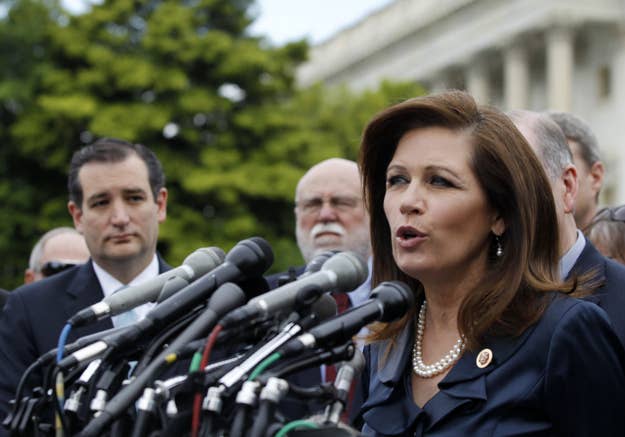
WASHINGTON — Two and half years after the tea party swept Republicans back into power in the House and remade the political landscape, the movement finds itself at a crossroads, with its most famous champions exiting the halls of Congress one after another.
Allen West was voted out, Jim DeMint left to go run the Heritage Foundation, and Michele Bachmann announced last week that she would not run for re-election.
The most recognizable and vocal members of the tea party are gone from the Capitol, and Democrats have proclaimed the movement on the decline. But tea party activists — enlivened by the slew of scandals to hit the Obama White House in recent weeks, and seeing their elected officials' favorability ratings rise — say they have had a lasting impact that extends well beyond the Bachmanns and Wests of the world.
"There's still talk of the 'tea party,' but what is more important are the principles and the ideology the tea party have been championing are now more seriously considered as pieces of legislation," said Jenny Beth Martin, co-founder of the Tea Party Patriots. "We're a long way from the point where we were only complaining. Instead of complaining from the outside, there's real debate happening within the halls of Congress."
Bachmann, West, and DeMint were never real legislative power players, but the movement that made them stars is still affecting legislation. Many members of the House Republican majority do not assign themselves the "tea party" label, but they espouse much of the small economy, anti-spending principles that the tea party champions. This was evident early in 2013 when the majority of House Republicans voted against both a $50 billion relief package for victims of Hurricane Sandy and the fiscal cliff deal that let some of the Bush tax cuts expire.
There's also a new wave of tea party leaders emerging: In the Senate, Sens. Ted Cruz and Rand Paul are most often pointed to as the new standard-bearers in Congress. Their influence has rippled throughout the party: from the many Republicans who joined Paul in his 13-hour filibuster this year on Obama's drone policy, to Senate Minority Leader Mitch McConnell, who has worked overtime to appeal to tea partiers as he faces re-election in 2014.
Currently, Paul and Cruz, along with Sens. Mike Lee and Marco Rubio, are objecting to a budget conference committee — which would feature members of House and Senate working to hash out a budget deal — worried that the debt ceiling will be raised as part of those negotiations.
Additionally, the revelation that the IRS was targeting conservative and tea party groups for extra scrutiny has revived activists across the country.
"To say it's matured, there's a connotation there that it was somehow not mature. It was new, and we were figuring things out and just protesting," said Brendan Steinhauser, a conservative activist in Texas. "Now we are inside of Congress, we're in state legislatures, we are trying to pass legislation."
Steinhauser, who used to be the director of federal and state campaigns at FreedomWorks, said there didn't need to be just once face or politician to take up the tea party mantle in Congress because so many Republicans were already there.
"The issues that we care about, fiscal responsibility, the national debt, those are things that everyone on the Republican side is talking about right now," he said.
Not everyone is thrilled about the tea party's staying power. Republican Sen. John McCain has been openly critical of his colleagues for objecting to a budget conference. Spats between House leadership and conservatives are nothing new.
Brian Walsh, a Republican strategist and former communications director for the Senate Republican campaign arm, predicted a boost in the tea party's effectiveness heading into the 2014 election, if they can keep their focus squarely on Democrats.
"I think the tea party was and is most effective when their attention is focused on the Democrats and their agenda. It suffers when attention is diverted from that and turns against other Republicans," he said.
"These scandals that have taken place are helping to reignite that fire in the grassroots that has been lacking in recent months," Walsh added. "When you are shifting attention away from President Obama and his spending initiatives and focus it on purity tests among other Republicans, that's to the long-term detriment of the party. But as a whole, the tea party has been beneficial into shifting the debate back onto spending and the debt where it should be."
Democrats point to the fact that the movement failed to capture the same enthusiasm of the 2010 election in 2012, and after Republicans took a beating at the polls in November, Democratic Congressional Campaign Committee chairman Steve Israel declared the "tea party wave was reversed."
Conservative Senate candidates —like Indiana's Richard Mourdock and Missouri's Todd Akin — lost in seats in states that should have been easy for Republicans to win. House Democrats picked up seats. President Obama was re-elected, and with his re-election came the certainty his health care law, a uniting foe for Republicans, would not be repealed anytime soon.
But the IRS scandal and the looming debt ceiling fight are sure to bring out activists again.
"I think they are alive and well and, like so many Republicans, dusted themselves off after a bruising election," said Republican strategist Ron Bonjean.
Democrats are still promising to make 2014 a second referendum on tea party politics and plan to keep people like Bachmann as the face of not just the tea party but all House Republicans.
"Michele Bachmann's tea party brand of extremism and obstruction have infected the entire Republican Congress," said DCCC spokeswoman Emily Bittner, "and her influence shows no signs of waning."
